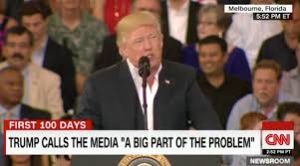More than we may want to acknowledge, a large segment of the society is comfortable buying what Donald Trump is selling.
In a recent opinion piece in the New York Times Columnist Carlos Lozada wrote that “throughout Trump’s life, he has embodied every national fascination: money and greed in the 1980s, sex scandals in the 1990s, reality television in the 2000s, social media in the 2010s. Why wouldn’t we deserve him now?” Lozada notes that “the tragedy is not that this election has taken us back, but that it shows how there are parts of America’s history that we’ve never fully gotten past.”

The same view is quietly expressed in peer nations. Many believe we live in a culture awash in sensation-seeking and shallow pursuits. Even a sober friend of the U.S., former German Chancellor Angela Merkel, wonders what is going on. She expressed “sorrow” at Trump’s election because of her own experiences in his presence at international meetings. “He was obviously very fascinated by the Russian president,” she wrote in her new memoirs. “I had the impression that politicians with autocratic and dictatorial traits captivated him.“ She also recalls the telling incident when he refused to shake her hand: an early clue to his basic rudeness. His aberrant behavior then was less focused on how the international community might solve common problems and more on the chances to exploit them.
The grifter is a familiar sometimes admired American type. More than we want to acknowledge, the avaricious President-elect is more like us than we might admit.
At its worst, American culture has shrunk from the idea of the common good or acceptance of the values and actions of humane and shared power. Our cultural interests seem to have narrowed to the shorter purview of how politics affects the acquisition of things or experiences. We may be comfortable, but we resent those who have even more. Hence, the price of gasoline matters more than attempts to mitigate the effects of its overuse. And vacationing like a prince can occur in the absence of awareness of basic realities like the monstrous American carbon footprint. According to the World Bank, the U.S. is far ahead of other nations in per capita consumption, doubling the rates of other peer states like France and those of Scandinavia. The idea of sufficiency doesn’t really apply. We have more clearly turned ourselves into exuberant materialists.
In the process of trying to purchase our way to a Mar-a-Lago of comforts, our older children now acquire huge amounts of consumer debt, most Americans drive fat cars, and cities are designed to accommodate them. Black Friday and Cyber Monday seem to have become national holidays for expressing our accumulated abundance. Many have forgotten the collective values once fostered by presidents, including sacrifice for the good of other democracies, or honoring our birthright commitment to accept new arrivals. As Lozada notes, in America there is “a long tradition of xenophobia — against Southern Europeans, against newcomers from Asia, Latin America and the Middle East.” Under the next President this embedded habit is in danger of becoming a core American principle.
 Beyond of love of things, where is the compensating consciousness of the nation’s giants of art and literature? The first Trump White House was mostly a no-go zone for concerts. I suspect the Scottish and Italians have a better collective awareness of titans in their shared past. The Japanese, British and Swedes seem to be ahead of us in protecting their nations’ natural assets. Even the simple pleasures of using nearby public spaces seem overlooked, with many localities barely providing basic amenities like sidewalks or housing for the destitute. In economist Kenneth Galbraith’s words, our mantra seems to be to amass “private wealth” even at the expense of “public squalor.”
Beyond of love of things, where is the compensating consciousness of the nation’s giants of art and literature? The first Trump White House was mostly a no-go zone for concerts. I suspect the Scottish and Italians have a better collective awareness of titans in their shared past. The Japanese, British and Swedes seem to be ahead of us in protecting their nations’ natural assets. Even the simple pleasures of using nearby public spaces seem overlooked, with many localities barely providing basic amenities like sidewalks or housing for the destitute. In economist Kenneth Galbraith’s words, our mantra seems to be to amass “private wealth” even at the expense of “public squalor.”
Of course broad generalizations are subject to many exceptions. “We” can only be a suggestive pronoun when broadened to represent an entire culture. And the U.S. covers a large part of an entire continent. But 63 million Americans voted for Trump in 2016, and a commanding 76 million this time around. His bluster and fakery does not represent everyone. But many accept his forged identity as an achiever and a builder. As Daniel Boorstin noted long ago, America is the natural home of the “man on the make:” the striver who delivers more bluster than truth about achieving material success. With our now ominous avoidance of serious cultural ideas and ideals, more of us are willing to rely on the thinest of impressions to to buy what Trump is selling.

 Nothing stands out more in the rhetoric of Donald Trump than his apparent pleasure in pitting Americans against each other.
Nothing stands out more in the rhetoric of Donald Trump than his apparent pleasure in pitting Americans against each other. 
